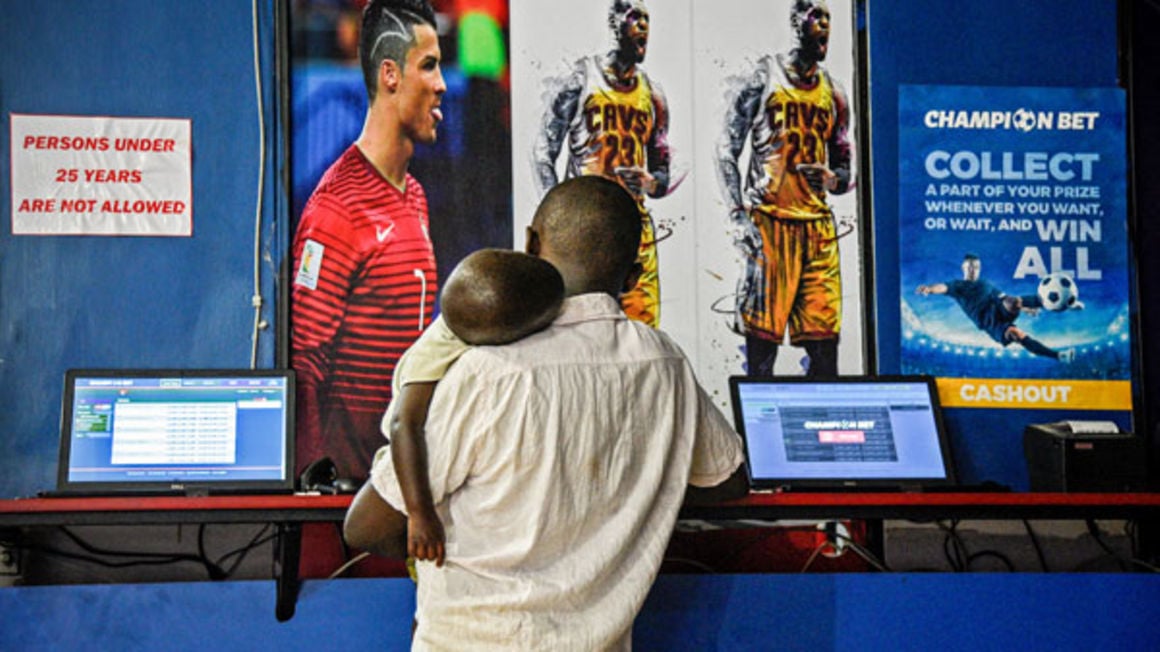Gaming operators under declaring revenue by half - audit

This file photo shows a man with his child bets on football games at sports betting shop in Kampala, Uganda. AFP PHOTO
What you need to know:
- Ms Juliet Namuli warned that they are unlikely going to meet their Shs50.6b target in the coming financial year, citing the negative impact caused by Covid-19 imposed lockdown on gaming centres, which has caused a 36 per cent reduction of the revenue collection in the last eight months.
The Parliamentary Committee on Finance yesterday heard that the lotteries and gaming industry has been under declaring its revenue by half, causing government Shs50b loss in revenue.
The board’s IT manager, Mr Denis Mudene, said they did an audit about two years ago which revealed that they are supposed to be collecting at least Shs100 billion but were instead receiving Shs50b annually.
“Relying on an audit we did, we believe the operators under declare by almost more than a half taxes. We expect about Shs100b but they are declaring around Shs50b,” Mr Mudene said.
This was after the Lotteries and Gaming Regulatory Board headed by Ms Juliet Namuli presented its ministerial policy to Parliament for the financial year 2021/2022. Ms Namuli advised that for the board to avoid such losses, there is need to procure a national central electronic monitoring system to detect irregularities during inspection.
The system, Ms Namuli added, will be connected to National Identification and Registration Authority to match the data for easy analysis on individual performance.
Ms Namuli said government allocated them Shs6.37b for 2020/2021 financial year instead of Shs12.87b they had requested to procure the system.
“The shortfall of Shs6.5b was meant to pay for the first two installments of the National Central Electronic Monitoring System (NCEMS). However, due to lack of funds, the implementation was halted until the funds are availed,” Ms Namuli told the MPs.
“This system will enhance revenue collection by detecting and monitoring significant events associated with gaming activities, analyse, report and received data,” she added.
But the Finance committee chairman, Mr Henry Musasizi, interjected, asking whether that money wasn’t released in 2018/2019 budget.
“But this money was provided some time back. Did you return it to the treasury?” he asked.
Ms Namuli said they had returned the money after they failed to use it that year, and subsequent requisitions for the funds haven’t been granted.
Pakwach Woman MP Jane Pacutho inquired what the board was doing to reduce the harmful effects of gaming, especially among the youth.
In response, Ms Namuli said once they have the electronic monitoring system hooked to NIRA and Uganda Revenue Authority, it will be easy to determine the frequency within which each participant plays the games and track their age group.
She also said they have partnered with regional referral hospitals to treat people who have gambling challenges.
Ms Namuli said all casinos will be required to register everybody who enters their premises to reduce the negative effects.
“Gaming is an activity for leisure not regular work to make money. Minors of 25 years of age and below are not allowed. We don’t expect someone to spend the whole day in the gaming premises. We do regular inspection and are planning to open regional offices. We appeal for more funding to facilitate human resource in these offices,” Ms Namuli said.
Budget shortfall
Ms Juliet Namuli warned that they are unlikely going to meet their Shs50.6b target in the coming financial year, citing the negative impact caused by Covid-19 imposed lockdown on gaming centres, which has caused a 36 per cent reduction of the revenue collection in the last eight months. Their target is to license at least 70 operators with about 1,500 premises. “Every operator is mandated to pay gaming tax for their operations. Our sector was closed for eight months which greatly affected our performance. The sector we regulate is very dynamic. Games keep changing. We have to do continuous research to inform our decisions,” she said.




